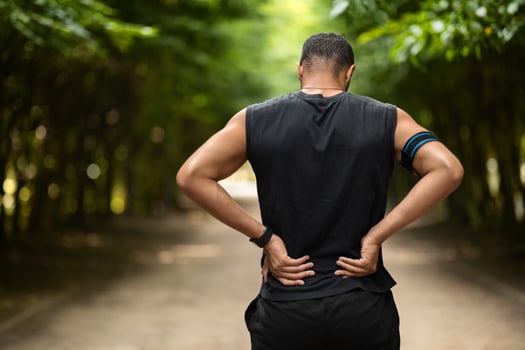
A herniated spinal disc can cause pain in lower body areas, and this sometimes includes the buttocks. Whether this applies to you depends on which nerve is affected and the symptoms you are experiencing. This article further explores this topic and offers tips on how to deal with this particular type of discomfort.
Lower Back Herniated Discs
The spinal discs in the lower back area often cause discomfort in the buttocks. This is a sign to pay attention to if you have not yet received an official diagnosis. You likely have a herniated disc affecting your sciatic nerve if pain in the buttocks is combined with:
• Pain in your lower back
• Radiating pain and related symptoms such as tingling sensations
• Discomfort that comes and goes depending on your position and what you are doing
• General weakness within the affected area(s)
Diagnosis and Treatment
Pain in the buttocks can also be related to muscle irritation. A common culprit is the piriformis muscle, a deeper muscle that is located not too far away from the sciatic nerve. For this reason, it is not unusual to experience symptoms very similar to those caused by a herniated spinal disc. This is why it is important to get an accurate diagnosis before assuming your discomfort is related to a herniated disc, especially if this is the only symptom you are experiencing.
Treatment depends on the cause of the discomfort and a diagnosis based on tests and a discussion of the symptoms. If you do have a herniated spinal disc, there are several nonsurgical remedies that may be beneficial. Typical recommendations include:
• Medication to manage inflammation
• Injections directly into the affected area
- Physical therapy customized to a patient’s specific needs and priorities
• Posture improvement exercises
Prevention Tips
Taking care of your overall health and wellbeing is one of the most effective ways to prevent sciatica, herniated discs, and muscle irritation—the three most common causes of pain that extends to the buttocks region. It is always a good idea to maintain proper posture, since this is a common cause of herniated spinal discs. Eating well-balanced meals is another important step you can take to prevent herniated discs and other causes of lower body discomfort. Eat foods that prevent inflammation and strengthen spinal bones and discs, such as dairy products, fresh fruits and vegetables, and lean proteins such as skinless chicken and turkey. It is also helpful to get regular exercise, which can be done in water if land-based exercises are too difficult for you to perform.
If you have a herniated disc that is not responding to conservative treatment, a discectomy may be discussed and potentially recommended. Although this is generally a very successful procedure, having a large hole in the outer ring of the disc more than doubles the risk of needing another operation. A new treatment, Barricaid, is a bone-anchored device that closes this hole, and 95 percent of Barricaid patients did not undergo a reoperation due to reherniation in a 2-year study timeframe. This treatment is done immediately following the discectomy—during the same operation—and does not require any additional incisions or time in the hospital.
If you have any questions about the Barricaid treatment, ask your doctor or contact us at 844-288-7474.
For full benefit/risk information, please visit: https://www.barricaid.com/instructions.


Comments